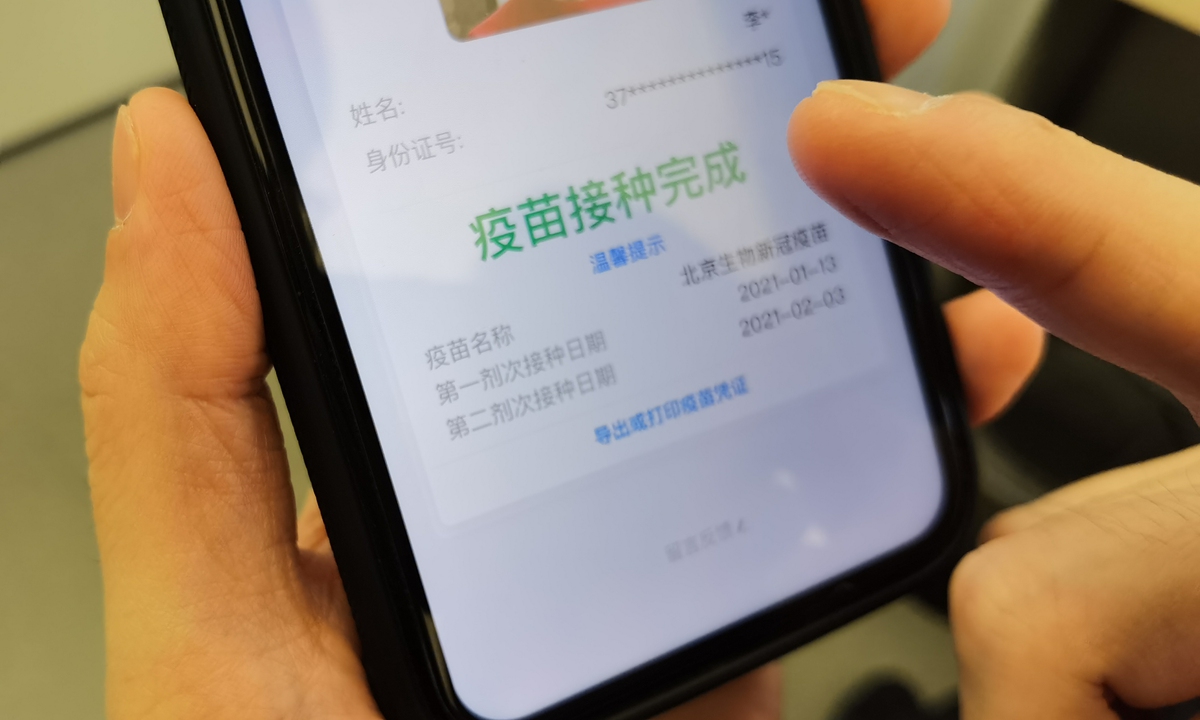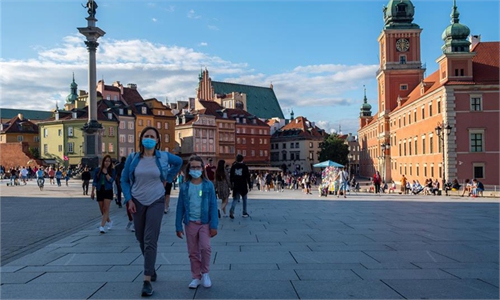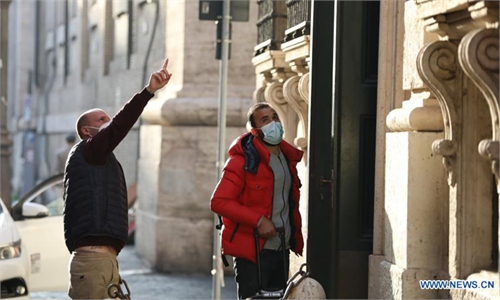EU’s summer vaccine passports plan ‘infeasible,’ may trigger new wave of coronavirus

A Beijing resident points at his digital vaccine certificate on a health tracking app showing he has received two doses of COVID-19 vaccine. Photo: Yang Ruoyu/GT
Chinese health experts believe the EU's plan of digital vaccine travel certificates or "vaccine passports" was more political for economic recovery but not feasible scientifically at a time when emerging new variants of coronavirus raise doubts on the efficacy of vaccines, warning that the reckless move may trigger a new wave of pandemic in Europe.
However, experts gave credit for the idea in the long run, and said a globally recognized vaccine certificate should be established under the framework of the World Health Organization and could be introduced for international events such as the Beijing Winter Olympics in 2022.
EU leaders are discussing the vaccine passports issue via a virtual meeting on Thursday and Friday to decide whether EU-wide travel would be allowed this summer, and have not come up with a unified plan, as the leaders of the 27 countries were divided on the issue.
Tourism-dependent southern European nations such as Greece and Spain have been calling for an EU vaccination certificate for travelers since January. However, countries like France and Germany believe it would create a "de facto vaccination obligation" and result in discrimination, DW reported.
When 26 out of the 27 EU countries have found variants of coronavirus and German Chancellor Angela Merkel warned of a more aggressive third wave of coronavirus possibly triggered by new mutations, introducing the vaccine passports to stimulate economic recovery is way too early and risky, Chinese health experts said.
"Because of (variants), we are entering a new phase of the pandemic, from which a third wave may emerge,'' Merkel told the Frankfurter Allgemeine Zeitung on Wednesday.
A Beijing-based immunologist who requested anonymity told the Global Times on Friday that vaccine passports could provide convenience for travel, but so far it's a purely political consideration, either for the purpose of promoting a vaccination campaign or economic recovery.
"International scientists have not figured out the real efficacy of vaccines amid virus variants, and it takes five to 10 years to find out the real efficacy, and how long vaccine protection can last also remains unknown," the immunologist said.
Adopting vaccine passports to allow travel may further worsen the pandemic in Europe this summer, especially with the influence of the new virus mutations frequently reported and possible recombinant strains of the novel coronavirus with other coronavirus, he said.
Europe is not new to the summer spike of coronavirus cases. Italy reopened to travelers from Europe in June 2020, three months after the country went into a lockdown, and more EU countries followed.
By August, the 27 EU countries and the UK had seen a spike in cases, and the total number surpassed the US in October in terms of new cases per million for the first time since spring, which experts believe was caused by Europe's failure to balance the need to restart the economy and protect public health.
As the WHO has predicted that vaccines in some developing countries, especially those in Africa, would be available by 2023, the vaccine passports in the EU have served to block developing countries, which is unfair and discriminatory, the immunologist said.
However, the vaccine passports plan was a future direction, and should be established and adopted under the WHO's advice and take consideration of the international community, experts said.
Zeng Guang, the chief epidemiologist at the Chinese Center for Disease Control and Prevention, told the Global Times on Friday that the digital vaccine certificate is worth promoting globally in the future to promote people-to-people exchanges and stimulate economic recovery.
China is taking the lead in forming a national digital vaccine certificate, as detailed information such as vaccine brand and receiving time is now available in the Chinese health code system, which could also check nucleic acid testing results, Zeng said.
He said the globally recognized vaccine certificates should take consideration of the virus mutations to assess vaccines efficacy and adjust the vaccines included in certificates according to the assessment.
The global vaccine certificates could also be introduced during major international events, such as the Beijing 2022 Winter Olympics, he said.




